过去进行时语法讲解
过去进行时语法

一、用动词的适当形式填空1. While we __________ (wait) for the bus, a girl __________ (run) up to us.2. I __________ (telephone) a friend when Bob __________ (come) in.3. Jim __________ (jump) on the bus as it __________ (move) away.4. We __________ (test) the new machine when the electricity __________ (go) off.5. She __________ (not want) to stay in bed while the others ________________ (all, work) in the fields.6. While mother ________ (put) Cathy to bed, the door bell ________ (ring).7. As I __________ (walk) in the park, it __________ (begin) to rain.8. Even when she ___________ (be) a child she ________________ (already, think) of becominga ballerina (芭蕾舞演员).9. It was quite late at night. George __________ (read) and Amy __________ (ply) her needle when they __________ (hear) a knock at the door.10. There __________ (be) a group round the fire when they __________ (reach) it. An old woman __________ (sit) on the ground near the kettle; two small children __________ (lie) near her;a donkey __________ (bend) his head over a tall girl.11. I _____ (have) my breakfast at half past six yesterday morning.12. Mary _____ (go) over her lessons from six to seven last night. John and peter ____(do) the same thing.13. What _____ you ___ (do) at that time? We _____ (watch) TV.14. Was your father at home yesterday evening? Yes ,he was. He _____ (listen) to the radio.15. They _____(not make) a model ship when I saw him.16. _____ they ____ (have) a meeting at 4 yesterday afternoon?No, they _____. They _____ (clean) the classroom.17. ______ it ______(rain) when you left school? Yes, it ____. (No, it ____)18. What _____ your father _____ (do) when he was your age?19. One day, Edison _____ (wait) for a train to arrive, and suddenly a little boy ran to the track(轨道) to play.20. He asked me if I ______ (go) fishing that afternoon.21. The three of them were in a hurry because their plane _____ (leave) in five minutes.22. In a letter, john told us that he _____ (come) to china next month.23. When the bell rang, jenny _____ (wait) in her seat.24. She _____ (make) her dress the whole afternoon.25. While my father ____ (look) through the evening paper, he suddenly ____ a cry.26. When I ____ (come) in the room, he ____ (see) me, for he ____ (read) something27. When we _____ (arrive) at the village, it _____ (get) dark and it _____ (rain) hard.28. I _____ (know) you ____(wait) for me here.29. One day a little monkey ____(play) in a tall tree. A mother crocodile(鳄鱼) ____ (look) for food near the bank.30. What ____ your father ____ (do) yesterday evening? He ____ (study) at the evening school.31. Later his parents found that he _____ (sit) on some eggs.32. When he knocked at the door, my aunt ____ (cook)33. The students ______ (sing) and ____ (dance) happily on the playground at that time.34. I ____ (write) a letter when the door bell rang.35. We had no classed at that time. We ____ (plant) trees.二、选择题1.I ______ cooked a meal when you _____ me.a. cooked, were ringingb. was cooking, rangc. was cooking, were ringingd. cooked, rang2.He said he _____ to draw a plane on the blackboard at that time.a. triesb. triedc. was tryingd. will try3.While she ______ TV, she ______ a sound outside the room.a. was watching, was hearingb. watched, was hearingc. watched, heardd. was watching, heard4.They _____ a football game from 7 to 9 last night.a. were watchingb. watchc. watchedd. are watching5.What book ____ you ______ when I ____ you at four yesterday afternoon?a. did, read, was seeingb. did, read, sawc. were, reading, sawd. were, reading, was seeing6.It was Friday evening. Mr and Mrs. Green _____ ready to fly to England.a. are gettingb. getc. were gettingd. got7.Lei Feng _____ always _____ of others when he ______ in the army.a. is, thinking, wasb. was, thinking, isc. did, think, isd. was, thinking, was8.A girl ______ my pen fall off the table when she _____ me.a. saw, passedb. was seeing, passedc. was seeing, passedd. was seeing, was passing9.We ____ for tom at ten last Sunday. He often kept us ______.a. were waiting, waitingb. were waiting, waitc. waited, waitingd. waited, wait10.He ____ his father on the farm the whole afternoon last Saturday.a. helpsb. would helpc. was helpingd. is helping11.While mother _______ some washing, I _____ a kite for Kate.a. did, madeb. was doing, madec. was doing, was makingd. did, was making12."_______ you angry then?" "they ______ too much noise."a. are, were makingb. were, were makingc. are, maded. were, made13.He ____ some cooking at that time, so _____ mea. did, heardb. did, didn't hearc. was doing, heardd. was doing, didn't hear14.This time yesterday jack _____ his bike. He _____ TVa. repaired, didn't watchb. was repairing, watchedc. repaired, watchedd. was repairing, wasn't watching15.His parents wanted to know how he _____ on with his new classmates.a. was gettingb. getsc. is gettingd. will get。
英语语法过去进行时详细讲解
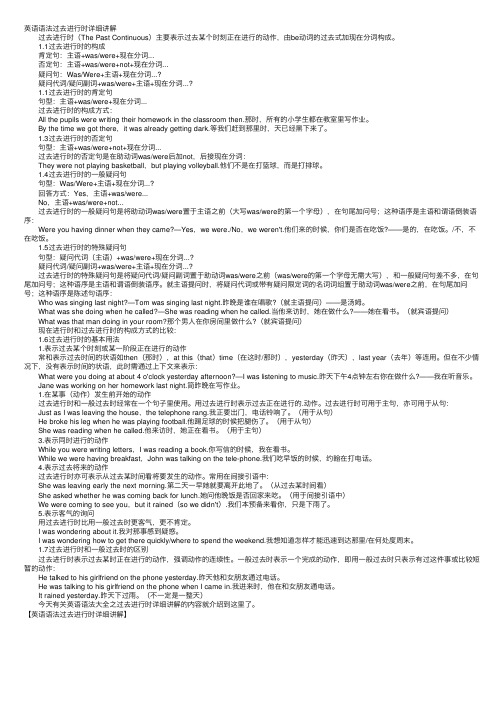
英语语法过去进⾏时详细讲解 过去进⾏时(The Past Continuous)主要表⽰过去某个时刻正在进⾏的动作,由be动词的过去式加现在分词构成。
1.1过去进⾏时的构成 肯定句:主语+was/were+现在分词... 否定句:主语+was/were+not+现在分词... 疑问句:Was/Were+主语+现在分词...? 疑问代词/疑问副词+was/were+主语+现在分词...? 1.1过去进⾏时的肯定句 句型:主语+was/were+现在分词... 过去进⾏时的构成⽅式: All the pupils were writing their homework in the classroom then.那时,所有的⼩学⽣都在教室⾥写作业。
By the time we got there,it was already getting dark.等我们赶到那⾥时,天已经⿊下来了。
1.3过去进⾏时的否定句 句型:主语+was/were+not+现在分词... 过去进⾏时的否定句是在助动词was/were后加not,后接现在分词: They were not playing basketball,but playing volleyball.他们不是在打篮球,⽽是打排球。
1.4过去进⾏时的⼀般疑问句 句型:Was/Were+主语+现在分词...? 回答⽅式:Yes,主语+was/were... No,主语+was/were+not... 过去进⾏时的⼀般疑问句是将助动词was/were置于主语之前(⼤写was/were的第⼀个字母),在句尾加问号;这种语序是主语和谓语倒装语序: Were you having dinner when they came?—Yes,we were./No,we weren't.他们来的时候,你们是否在吃饭?——是的,在吃饭。
/不,不在吃饭。
1.5过去进⾏时的特殊疑问句 句型:疑问代词(主语)+was/were+现在分词...? 疑问代词/疑问副词+was/were+主语+现在分词...? 过去进⾏时的特殊疑问句是将疑问代词/疑问副词置于助动词was/were之前(was/were的第⼀个字母⽆需⼤写),和⼀般疑问句差不多,在句尾加问号;这种语序是主语和谓语倒装语序。
过去进行时态语法讲解部分
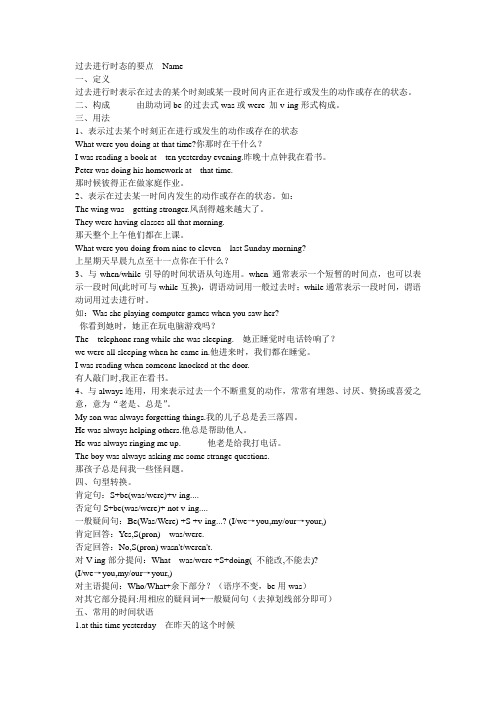
过去进行时态的要点Name____________一、定义过去进行时表示在过去的某个时刻或某一段时间内正在进行或发生的动作或存在的状态。
二、构成由助动词be的过去式was或were 加v-ing形式构成。
三、用法1、表示过去某个时刻正在进行或发生的动作或存在的状态What were you doing at that time?你那时在干什么?I was reading a book at ten yesterday evening.昨晚十点钟我在看书。
Peter was doing his homework at that time.那时候彼得正在做家庭作业。
2、表示在过去某一时间内发生的动作或存在的状态。
如:The wing was getting stronger.风刮得越来越大了。
They were having classes all that morning.那天整个上午他们都在上课。
What were you doing from nine to eleven last Sunday morning?上星期天早晨九点至十一点你在干什么?3、与when/while引导的时间状语从句连用。
when 通常表示一个短暂的时间点,也可以表示一段时间(此时可与while互换),谓语动词用一般过去时;while通常表示一段时间,谓语动词用过去进行时。
如:Was she playing computer games when you saw her?你看到她时,她正在玩电脑游戏吗?The telephone rang while she was sleeping. 她正睡觉时电话铃响了?we were all sleeping when he came in.他进来时,我们都在睡觉。
I was reading when someone knocked at the door.有人敲门时,我正在看书。
语法精讲---过去进行时

语法精讲八:动词时态(三)过去进行时一、定义过去进行时表示过去某一时刻或者某段时间正在进行或发生的动作,常和表过去的时间状语连用。
Eg. I was doing my homework at this time yesterday.昨天的这个时候我正在做作业。
二、构成句式1.肯定形式:主语+was/were+V-ing2.否定形式:主语+was not (wasn't)/were not (weren't)+V-ing3.疑问形式:Was/Were+主语+V-ing三、基本用法、1.过去进行时表示过去某一段时间或某一时刻正在进行的动作。
常与之连用的时间状语有,at that time/moment, (at) this time yesterday (last night/Sunday/week…), at+点钟+yesterday (last night / Sunday…),when sb. did sth等时间状语从句,Eg. What were you doing at 7p.m. yesterday? 昨天晚上七点你在干什么?I was cooking when she knocked at the door. 她敲门时我正在做饭。
2.当两个一长一短的动作在过去某时间同时发生时,用过去进行时表示较长的动作。
过去进行时可用于主句,也可用于从句。
Eg. It was raining hard when I left my office. 当我离开办公室时,雨下得正大。
They were watching TV when the lights went out.停电时,他们刚好在看电视。
3.过去进行时表示过去将来的动作Eg. She went to see Xiao Li. He was leaving early the next morning.她去看小李。
他第二天一早就要离开此地了。
过去进行时的语法讲解
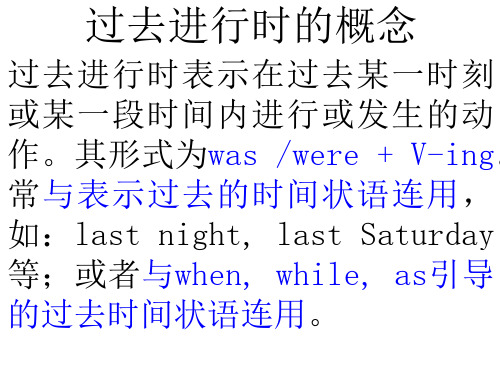
过去进行时的概念过去进行时表示在过去某一时刻或某一段时间内进行或发生的动作。
其形式为was/were+V-ing。
常与表示过去的时间状语连用,如:last night,last Saturday 等;或者与when,while,as引导的过去时间状语连用。
过去进行时的结构1.过去进行时由“主语+was/were+现在分词”构成。
例如:W e w e r e h a v i n g supper when the phone rang.2.过去进行时的否定式由“主语+was/were not+现在分词”构成。
例如:This time yesterday Jack was not watching TV.He was repairing his bike.3.过去进行时的疑问式由“was/were+主语+现在分词”构成。
例如:Were you playing basketball at four yesterday afternoon?过去进行时与一般过去时的比较1.一般过去时往往表示某一动作已经完成,而过去进行时却表示动作在持续或未完成。
(延续性动词)She wrote a letter to her friend last night.(信写完了)She was writing a letter to her friend last night.(信不一定写完)2、一般过去时表示只做一次动作,而过去进行时却表示动作反复地进行。
(短暂性动词)例句:She waved to me.她朝我挥了挥手。
3、句中有a moment ago之类的短语一般用一般过去时。
4、句中有at this time last Sunday,from8 to9yesterday之类的状语一般用过去进行时。
过去进行时可以用来代替一般过去时,表示更为偶然而非预定的动作:I was talking to Tom the other day.注释:这里的过去进行时给人的印象是这一动作既不特殊,也不引人注目。
过去进行时语法讲解加练习

What was Alice doing when I got out of the shower from the bathroom?
She was playing the piano.
Pairwork:
Patterns:
A: What were you doing at nine o’clock last Sunday morning? B: I was sleeping. How about you?
① 表示过去某个时刻正在进行的动作。 例句: What were you doing at nine last night? 昨晚九点你正在干什么?
I was taking a shower at nine last night. 昨晚九点我正在洗澡.
They were playing basketball at 5 o’clock yesterday afternoon. 昨天下午五点他们在打篮球。
My mother was cooking dinner while my father was watching TV.
When the UFO landed, the boy was walking down the street.
when 和while的用法区别
==While the boy was walking down the street, the UFO landed
②:表示在过去某一时间内正在进行的动作。
She was writing a letter when I came in.
我进来时,她正在写信。 The barber was cutting my hair when they arrived. 他们到达时,理发师正在给我剪头发。
过去进行时知识点讲解
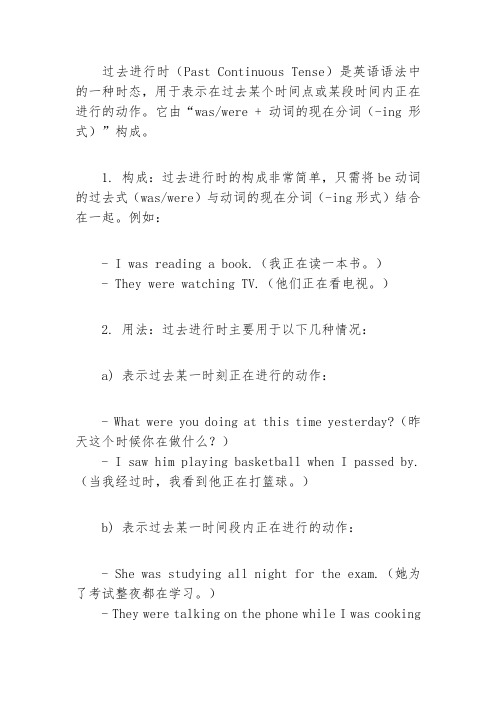
过去进行时(Past Continuous Tense)是英语语法中的一种时态,用于表示在过去某个时间点或某段时间内正在进行的动作。
它由“was/were + 动词的现在分词(-ing形式)”构成。
1. 构成:过去进行时的构成非常简单,只需将be动词的过去式(was/were)与动词的现在分词(-ing形式)结合在一起。
例如:- I was reading a book.(我正在读一本书。
)- They were watching TV.(他们正在看电视。
)2. 用法:过去进行时主要用于以下几种情况:a) 表示过去某一时刻正在进行的动作:- What were you doing at this time yesterday?(昨天这个时候你在做什么?)- I saw him playing basketball when I passed by.(当我经过时,我看到他正在打篮球。
)b) 表示过去某一时间段内正在进行的动作:- She was studying all night for the exam.(她为了考试整夜都在学习。
)- They were talking on the phone while I was cookingdinner.(我在做晚饭的时候,他们在打电话。
)c) 表示过去某一动作发生的背景或同时发生的另一个动作:- He was listening to music while he was working.(他在工作时听音乐。
)- She was reading a magazine when the phone rang.(电话响的时候,她正在看杂志。
)3. 注意事项:a) 当表示过去某一时刻正在进行的动作时,通常与表示过去的时间状语连用,如yesterday, last night, in 1990等。
b) 当表示过去某一时间段内正在进行的动作时,通常与表示过去的时间状语连用,如from 7 to 9 last night, all day yesterday等。
初中英语过去进行时详细讲解
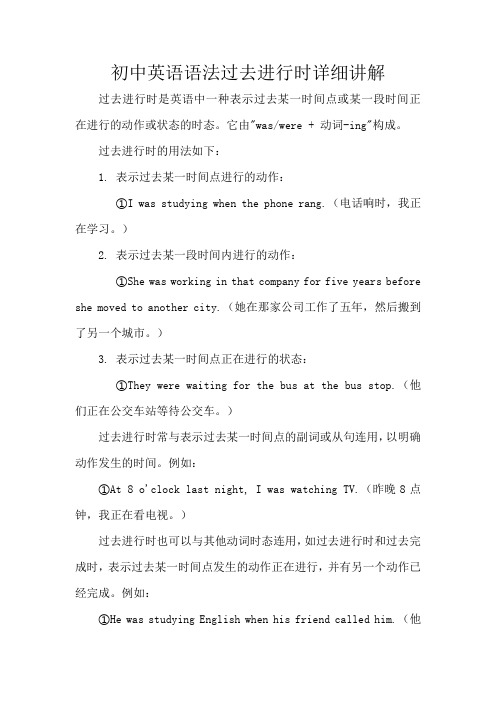
初中英语语法过去进行时详细讲解过去进行时是英语中一种表示过去某一时间点或某一段时间正在进行的动作或状态的时态。
它由"was/were + 动词-ing"构成。
过去进行时的用法如下:
1. 表示过去某一时间点进行的动作:
①I was studying when the phone rang.(电话响时,我正在学习。
)
2. 表示过去某一段时间内进行的动作:
①She was working in that company for five years before she moved to another city.(她在那家公司工作了五年,然后搬到了另一个城市。
)
3. 表示过去某一时间点正在进行的状态:
①They were waiting for the bus at the bus stop.(他们正在公交车站等待公交车。
)
过去进行时常与表示过去某一时间点的副词或从句连用,以明确动作发生的时间。
例如:
①At 8 o'clock last night, I was watching TV.(昨晚8点钟,我正在看电视。
)
过去进行时也可以与其他动词时态连用,如过去进行时和过去完成时,表示过去某一时间点发生的动作正在进行,并有另一个动作已经完成。
例如:
①He was studying English when his friend called him.(他
的朋友给他打电话时,他正在学习英语。
)
需要注意的是,过去进行时并不常用于表示短暂的动作或习惯性的动作。
对于这些情况,一般使用过去简单时。
- 1、下载文档前请自行甄别文档内容的完整性,平台不提供额外的编辑、内容补充、找答案等附加服务。
- 2、"仅部分预览"的文档,不可在线预览部分如存在完整性等问题,可反馈申请退款(可完整预览的文档不适用该条件!)。
- 3、如文档侵犯您的权益,请联系客服反馈,我们会尽快为您处理(人工客服工作时间:9:00-18:30)。
the other day.
用动词的正确形式填空:
had have) a headache last night. 1.My mother _____(
2.His uncle bought ______(buy) him a present a week ago.
have 3.He said hedidn’t ____ _____(not have) this morning. did get 4.What time ____you_____(get) up yesterday? Did enjoy 5._____they ____(enjoy) themselves last Sunday? 6.You weren’t _____(not be) at home this morning. Where did you _____(go)? go ____
2、判断特征
昨晚8:00 昨天这个时候 正在那个时候 昨晚6:00 到9:00 *昨天晚上 昨天当你到这儿时 刚才当我看见他们时 当你遇到他们时
at 8:00 last night this time yesterday at that time / at that moment from 6:00 to 9:00 last night *yesterday evening when you got here yesterday when I saw them just now when you met them
_________
考点.过去进行时与一般过去时的用法辨析。 1. The eyewitness said that the day ____ when he saw the UFO passing across the sky. (NMET 2000) ___________ A. is breaking B. was breaking C. broke D. was to break 过去进行时常与一般过去时搭配,过去进行时表示一个长的 动作,充当时间背景;一般过去时表示一个短的动作,该动作 就发生在过去进行时所提供的时间背景过程中。 2. — Has Sam finished his homework today? —I have no idea. He ______it this morning. (NMET2004-2) _________ A. did B. has done C. was doing D. had done 本题选B的错误是:现在完成时不能与明确过去时间状语 (this morning) 搭配且该答案与题干语境相矛盾。答案A段时 间状语与一般过去时搭配表示动作完成,这显然也与题干语 境相矛盾。而过去进行时与短时间状语搭配表示动作未完成, 正好与题干语境符合,所以答案为C
一般过去时与过去进行时的区别 2)过去进行时和一般过去时都可表示某段时间内发生的动作 或情况,但过去进行侧重动作持续时间的长度;而一般过去 时只说明过去某时发生某事,侧重说明事实。如: It was raining heavily last night. (侧重下雨持续时间长) It rained heavily last night. (侧重说明下雨这一事实)
B. ask
C. was asking
D. had asked
5.-- Sorry to have interrupted you. Please go on. -- Where was I ? -- You ______ C you didn’t like your father’s job. A. had said B. said C. were saying D. had been saying
一般过去时与过去进行时的区别 1、一般过时往往表示某一动作已经完成,而过去进行时却表 示动作在持续或未完成。
She wrote a letter to her friend last night. 她昨晚给朋友写了封信。 (信写完了)
_________
She was writing a letter to her friend last night. 她昨晚一直在给 朋友写信。 (信不一定写完)
Exercises: were listening 1.) They ______________ to the text this time yesterday. ( listen ) was waiting 2.) Mingming ______________ at the bus stop at half past one yesterday. ( wait ) wasn’t watching 3.) Fangfang ______________ a football match from 3:00 to 5:00 yesterday afternoon. ( not watch ) weren’t making 4.) The children _______________ model ships last Thursday.( not make )
我们外出时 昨天妈妈在做饭时
while we were out while my mother was cooking
while you were talking with John 当你在和John说话时 3、过去进行时常用于由when、while、as引导的时间状语从 句中,表示背景,引出由一般过去时表示的新动作。
3. He was hoping to go abroad but his parents B _that
they won’t support him unless he can borrow money
from the bank. A.were deciding C.decided B.have decided D.will decide (Hubei 2005)
While I was having dinner, someone knocked the door. As I was watching TV, he called me..
或:过去进行时(表示背景)+when+ 一般过去时(新发生 的动作)。此时when 相当于at that time; just then I was driving along this road when my car broke down.
一般现在时
一般过去时:表示过去发生的动作或存在的状态.
1.肯定句:
主语+动词的过去式+(宾语/表语)+过去时间. They came to visit China last year. 2.否定句: 主语+didn’t + 动词原形+(宾语)+过去时间. She didn’t do her homework last Sunday. 3.一般疑问句: Did +主语+动词原形+(宾语)+ 12.) When the bus _______(come) , he ___________(talk) to his friend.
5.) What _____ was he _______ doing at that moment? ( do ) was eating dinner with Mike when I entered his room. 6.) He ____________ ( eat ) ( make 第7题 ) was making 7.) She _______________a new dress when the house caught a fire. writing a letter in your room when I called 8.) Were ____ you ________ you ?(write) were holding 9.)They ______________a meeting when we got there. ( hold ) were visiting 10.)They ______________ our factory when we met them . ( visit ) were playing ( play )football on the playground 11.)The boys _____________ when we _______ left ( leave ) school yesterday.
was 10. Lucy _____(be) here just now.
The Past Continuous Tense ( 过去进行时) 1、基本概念 过去进行时表示在过去某一时刻或一段时间内正在 进行的动作,表示: was / were ( not )+现在分词。
I was writing a letter at 4 yesterday. They were playing basketball yesterday afternoon.
2. 过去进行时表示现在主要是为了使语气委 婉、客气。 如: I was wondering if you could give me a lift. 我不知你能否让我搭一下车 【注】一般过去时也有类似用法,但比较 而言,用过去进行时显得更客气,更不肯 定。能否让我搭一下车。
3. 过去进行时表示感情色彩与现在进行时 相似,过去进行时也可表示满意、称赞、 惊讶、厌恶等感情色彩,也通常与 always, forever, continually等副词连用。 如: They were always quarrelling. 他们老是吵架。
left 7.They ____(leave) for England two days ago. did you_____(see) see 8.When ____ the film last week?
